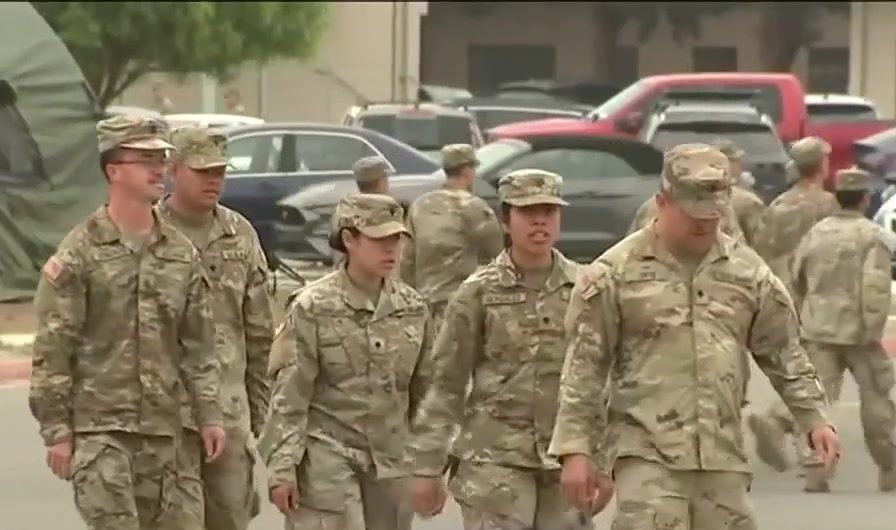PORTLAND, Ore. (AP) — A federal judge in Oregon ruled Friday that President Donald Trump’s administration failed to meet the legal requirements for deploying the National Guard to Portland. The city and state had sued in September to block the deployment.
The ruling from U.S. District Court Judge Karin Immergut, a Trump appointee, followed a three-day trial last week in which both sides debated whether protests at the city’s U.S. Immigration and Customs Enforcement (ICE) building met the conditions for using the military domestically under federal law.
The administration argued that troops were needed to protect federal personnel and property in a city that Trump described as “war ravaged” with “fires all over the place.”
In a 106-page opinion, Immergut found that although the president is entitled to “great deference” in his decision to call up the Guard, he did not have a legal basis for doing so. The judge ruled that Trump failed to establish there was a rebellion or danger of rebellion, or that he was unable to enforce the law with regular forces.
“The trial record showed that although protests outside the Portland ICE building occurred nightly between June and October 2025, ever since a few particularly disruptive days in mid-June, protests have remained peaceful with only isolated and sporadic instances of violence,” Immergut wrote.
“The occasional interference to federal officers has been minimal, and there is no evidence that these small-scale protests have significantly impeded the execution of any immigration laws.”
The White House did not immediately respond to a request for comment.
Oregon Attorney General Dan Rayfield said in an emailed statement, “The courts are holding this administration accountable to the truth and the rule of law. From the beginning, this case has been about making sure that facts, not political whims, guide how the law is applied. Today’s decision protects that principle.”
### Democratic Cities Fight Back
Democratic cities targeted by Trump for military involvement—including Chicago, which has filed a separate lawsuit—have been pushing back. They argue the president has not satisfied the legal threshold for deploying troops and that doing so would violate states’ sovereignty.
Judge Immergut issued two orders in early October blocking the deployment of troops leading up to the trial. The first order blocked Trump from deploying 200 members of the Oregon National Guard. The second order, issued a day later, blocked him from sending members of any state’s National Guard to Oregon after he tried to evade the first order by sending California troops instead.
Immergut has described Trump’s apocalyptic descriptions of Portland as “simply untethered to the facts.”
The 9th U.S. Circuit Court of Appeals has already ordered that the troops not be deployed pending further action by the appeals court. The trial held by Immergut further developed the factual record, which could serve as the basis for future appellate rulings.
### Demonstrations at ICE Building Peaked in June
Witnesses, including local police and federal officials, testified about law enforcement’s response to nightly protests at the city’s ICE building. The demonstrations peaked in June when Portland police declared one a riot. In the weeks leading up to Trump’s National Guard announcement, protests typically drew just a couple dozen people.
The Trump administration said it had to shuffle federal agents from elsewhere around the country to respond to the protests, which it characterized as a “rebellion” or “danger of rebellion.” Federal officials testified about staffing shortages and requests for more personnel that have not yet been fulfilled.
Among those called to testify was an official with the Federal Protective Service (FPS), the agency within the Department of Homeland Security that provides security at federal buildings. Due to safety concerns, the judge allowed the FPS official to testify under the initials R.C.
However, during cross-examination, R.C. said he did not request troops and was not consulted on the matter by Homeland Security Secretary Kristi Noem or President Trump. He added he was “surprised” to learn about the deployment and did not agree with statements suggesting Portland was burning down.
Attorneys for Portland and Oregon argued that city police have been able to respond effectively to the protests. After declaring a riot on June 14, the police changed their strategy to intervene primarily when person and property crimes occurred. Police officials testified that crowd numbers have largely diminished since the end of June.
According to court documents and testimony, the ICE building closed for three weeks over the summer due to property damage. Cammilla Wamsley, the regional field office director for ICE’s Enforcement and Removal Operations, said employees worked from another building during that period. The plaintiffs argued this showed ICE was able to continue its work functions despite the protests.
https://whdh.com/news/judge-rules-trump-administration-failed-to-meet-legal-requirements-for-deploying-troops-to-portland/


